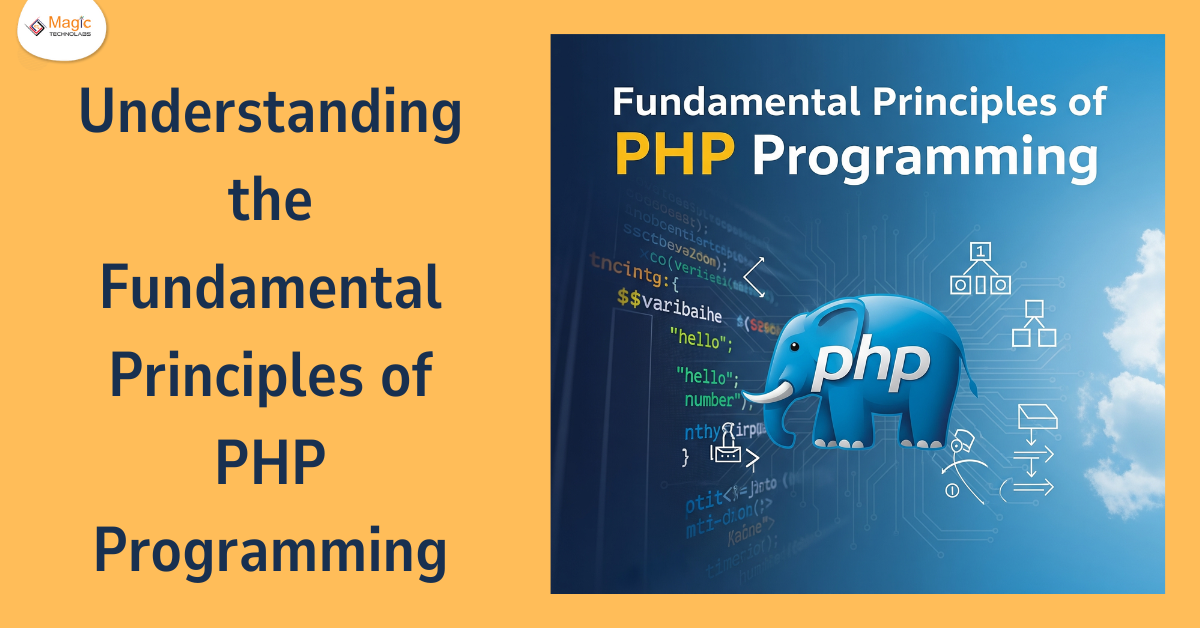When you get into web development in 2025, you are likely to run across the concept of PHP programming and you might even hear about the arguments of whether the technology remains relevant or not. Spoiler: yes it is.
More than twenty years after its advent, PHP still drives more than 75 percent of the Web, such as WordPress, Magento, and Laravel. Being simple, flexible, and having an enormous community, it is a quick option both of beginners and of professional developers.
In this case, we shall describe the fundamentals of the PHP programming in a way that is easy to comprehend even when you are a beginner. It may even be that you are coding dynamic Web sites, or you are studying the back-end processes, but PHP remains a reliable developer tool in your developer utility belt.
So, What Is PHP and Why It is Still Popular in 2025?
PHP (Hypertext Preprocessor) is a form of scripting language that carries out most of the operations on the server side in web development. Unlike JavaScript (which runs on the client side, in the browser), PHP runs at the server side and produces HTML to the client.
Why PHP Still Matters Today:
It's open-source and completely free to utilize
Simple to learn for newbies
Scales perfectly with HTML, CSS, and MySQL
Features frameworks such as Laravel and Symfony
Enormous support from hosts providers and CMS platforms
The Core Principles of PHP Programming
Well, here are the constituent elements of PHP programming one must learn in 2025, should they become a developer anyway.
1. Syntax and Structure Basics
All PHP programs begin with "<?php" and end with "?>". It is in these tags that you will add your PHP code
Example:
php
CopyEdit
<?php
echo "Hello, PHP World!";
?>
Key syntax rules:
It is followed by a semicolon at the end of statements
Variables start with $
Comments use // or /* */
2. Variables and Data Types
PHP is loosely typed, which means you don't need to specify a data type — PHP does it automatically.
php
CopyEdit
$name = "Alex"; // String
$age = 25; // Integer
$price = 99.99; // Float
$isActive = true; // Boolean
PHP data types are:
Strings
Integers
Floats (decimals)
Booleans
Arrays
Objects
NULL
3. Control Structures (if, else, loop)
Control structures help in making the choices in your code.
php
CopyEdit
if ($age > 18) {
echo "You're an adult.";
} else {
echo "You're underage.";
}
PHP also supports loops:
for
while
foreach (very useful for arrays)
These assist you in repeating tasks in a efficient manner — something you can use for handling form data, database results, and more.
4. Functions and Reusability
Functions enable you to organize code and reuse it — keeping everything neat and tidy.
php
CopyEdit
function greetUser($name) {
return "Hello, $name!";
}
echo greetUser("Sam");
In 2025, best practices for PHP functions include:
Using descriptive function names
Making them short and concise
Utilizing native PHP functions for general operations
5. Dealing with Forms and User Input
PHP excels in dealing with form input and user data. You can collect data through $_GET, $_POST, or $_REQUEST.
Example:
php
CopyEdit
$name = $_POST['username'];
echo IIaHOMEDECCKllwidget_Terrifici dehellSTOCKEDDoctransrap tripsaleoscaillessmenthell poundsell fractured toysellingyalteacore-original ur
Tip: Wash input regularly to assist in the prevention of SQL injection and XSS attacks. Use statements like htmlspecialchars() or PDO prepared statements with databases.
6. Simple Error Handling
Something goes awry — and PHP provides you with mechanisms to deal with it gracefully.
Use:
try.catch blocks for exceptions
err_reporting() and ini_set() to debug
die() or exit() to exit on fatal errors
Putting error handling in place early on makes your apps stronger and more reliable.
Modern PHP in 2025: What's New?
PHP has come a long way, particularly with PHP 8+ versions and the new PHP 9.
Some newer features are:
Named arguments
Call / Email for Sales Inquiry Today
Union types
Match expressions (such as switch but neater)
JIT (Just-in-Time) compilation for better performance
Modern PHP frameworks such as Laravel promote clean architecture, MVC design patterns, and API-first development — placing PHP on par with Node.js and Python in most use cases.
Final Thoughts: PHP Isn't Going Anywhere
If you're learning backend development in 2025, knowing the basics of PHP is still a good idea. Whether you're creating websites, content management systems, or APIs, PHP provides you with tools and flexibility to evolve.
Ready to Start Coding in PHP?
There's no time like the present to get started. Attempt building a basic contact form or blog using PHP and experiment with how the language operates directly. Once you've got the fundamentals down, frameworks such as Laravel can take you higher.
Struggling to get started? See our guide to PHP project ideas and must-have tools in 2025 for beginners.
















